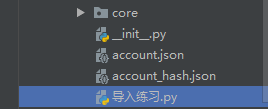import json
import os
import time as t
import hashlib
"""
导入模块的方式有哪几种,官方不推荐哪种?
import 包名
import module_a #导入
from module import xx
from module.xx.xx import xx as rename #导入后重命令
from module.xx.xx import * #导入一个模块下的所有方法,不建议使用
"""
"""
如何让你写的模块可以被系统上任何一个py文件导入
1,放在第三方库中site-package
from test_import import *
print(sum1(1,2))
"""
"""
写一个用户登录验证程序,文件名account.json,内容如下
1,根据用户输入的用户名&密码,找到对应的json文件,把数据加载出来进行验证
2,用户名为json文件名,密码为 password。
3,判断是否过期,与expire_date进行对比。
4,登陆成功后,打印“登陆成功”,三次登陆失败,status值改为1,并且锁定账号。
"""
def login():
count = 1
while True:
user_filename = input('请输入您的用户名:')
password = input('请输入您的密码')
mulu_path = os.path.dirname(__file__) # 当前所在的目录
file_path = os.path.join(mulu_path, user_filename)
if os.path.isfile(file_path): # 判断输入文件所在路径是否正确
with open(file_path, 'r') as f:
login_dict = json.load(f) # 将文件内容读取出来
if login_dict['status'] == 0 and count < 4: # 判断是否被锁定and登陆次数是否小于3
login_password = login_dict['password'] # 登录密码
expire_date_tuple = t.strptime(login_dict['expire_date'], '%Y-%m-%d') # 将过期时间转为元祖
expire_date_timestamp = t.mktime(expire_date_tuple) # 将过期时间元祖转为时间戳
now_timestamp = t.time() # 当前时间戳
if login_password == password and now_timestamp < expire_date_timestamp: # 密码 和 当前时间小于过期时间都成立(登陆成功)
print('登陆成功 ')
break
else:
if count == 3:
print('您的账户被锁定1')
else:
print('密码错误,登录失败请重试,您还剩下{}次机会'.format(3 - count))
else:
print('您的账户被锁定2')
with open(file_path, 'w', encoding='utf-8')as f: # 登录次数超过3次时被锁定
login_dict['status'] = 1
json.dump(login_dict, f)
break
else:
print('用户名错误,请重新输入')
count += 1
# login()
"""
写一个用户登录验证程序,文件名account.json,内容如下
1,根据用户输入的用户名&密码,找到对应的json文件,把数据加载出来进行验证
2,用户名为json文件名,密码为 password。
3,判断是否过期,与expire_date进行对比。
4,登陆成功后,打印“登陆成功”,三次登陆失败,status值改为1,并且锁定账号。
"""
def login_youhua():
count = 1
while count < 4: # 循环 3次
uesrname = input('请输入你的用户名:')
password = input('请输入您的密码: ')
mulu_path = os.path.dirname(__file__) # 当前目录路径
file_path = os.path.join(mulu_path, uesrname) # 拼接成文件的路径
try: # 放在try中执行
fr = open(file_path, 'r')
dict_file = json.load(fr)
fr.close()
guoqishijian_tuple = t.strptime(dict_file['expire_date'], '%Y-%m-%d') # 时间 元祖
guoqishijian = t.mktime(guoqishijian_tuple) # 过期时间的时间戳
now_time = t.time() # 当前时间的 时间戳
if dict_file['status'] == 0: # 判断是否状态为0
if password == dict_file['password']: # 判断是否登陆成功
if now_time < guoqishijian: # 判断是否过期
print('登陆成功')
break
else:
print('已过期')
break
else:
if count == 3: # 如果输入了三次将dict_file['status'] = 1写入文件
print('账号已锁定')
with open(file_path, 'w', encoding='utf-8')as f:
dict_file['status'] = 1
json.dump(dict_file, f)
break
else: # 否则提示密码错误
print('密码错误')
else:
print('已锁定') # 否则提示已过期退出程序
break
except Exception as e:
print('出错了{}'.format(e.args))
count += 1 # count放在这里,如果文件名输入错误三次也退出
# login_youhua()
"""
把第3题用户密码进行hashlib加密处理。即:json文件里的密码保存为md5的值,然后用md5的值进行验证账号信息是否正确。
"""
def login_youhua_hash():
count = 1
m = hashlib.md5()
while count < 4: # 循环3次
uesrname = input('请输入你的用户名:')
password_ming = (input('请输入您的密码:'))
m.update(password_ming.encode('utf-8')) # 将输入的密码传入到md5的对象m中
password = m.hexdigest() # 将16进制形式的密码赋值给password
mulu_path = os.path.dirname(__file__) # 当前目录路径
file_path = os.path.join(mulu_path, uesrname) # 拼接成文件的路径
try: # 放在try中执行
fr = open(file_path, 'r')
dict_file = json.load(fr)
fr.close()
guoqishijian_tuple = t.strptime(dict_file['expire_date'], '%Y-%m-%d') # 时间 元祖
guoqishijian = t.mktime(guoqishijian_tuple) # 过期时间的时间戳
now_time = t.time() # 当前时间的 时间戳
if dict_file['status'] == 0: # 判断是否状态为0
if password == dict_file['password']: # 判断是否登陆成功
if now_time < guoqishijian: # 判断是否过期
print('登陆成功')
break
else:
print('已过期')
break
else:
if count == 3: # 如果输入了三次将dict_file['status'] = 1写入文件
print('账号已锁定')
with open(file_path, 'w', encoding='utf-8')as f:
dict_file['status'] = 1
json.dump(dict_file, f)
break
else: # 否则提示密码错误
print('密码错误')
else:
print('已锁定') # 否则提示已过期退出程序
break
except Exception as e:
print('出错了{}'.format(e.args))
count += 1 # count放在这里,如果文件名输入错误三次也退出
login_youhua_hash()




